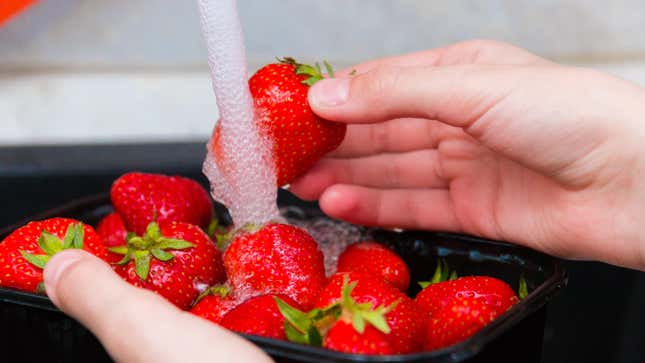
A recent analysis from advocacy organization Consumer Reports is the latest to highlight the potential threat of pesticides in our produce. It suggests that around 20% of commonly sold fruits and vegetables in the U.S. could contain unsafe levels of pesticides. Given that concerning news, you might be wondering how to lessen your risk of exposure. Rinsing produce under the tap is a common practice, but does it actually remove significant amounts of pesticide residue? Here’s what the research suggests.
To start, it’s important to note that the information analyzed by Consumer Reports comes from the U.S. Department of Agriculture’s Pesticide Data Program, which has been monitoring levels of pesticide residue across dozens of produce products over the past 30 years. These measurements are taken after the produce is washed with water and sometimes peeled, depending on the item. So there is a baseline assumption that people will wash their produce at home.
The effects of washing produce have been empirically studied. State officials at the Connecticut Agricultural Experiment Station published a study in 2000 that compared pesticide levels in store-bought produce before and after being rinsed with running water. They found that water noticeably decreased the residue remaining from nine out of the 12 pesticides that they measured.
In subsequent research, they also tested what happened to batches of produce under several different scenarios: leaving it unwashed, washing it with running water for a minute, washing it with a mix of water and soap, and washing it with four specially marketed produce wash products. They found that only the unrinsed produce showed noticeably higher levels of pesticide residue, meaning that running water alone was enough to remove pesticides.
The Centers for Disease Control and Prevention recommends against using anything besides water to wash fruits and vegetables. This isn’t just a pragmatic, money-saving tip: Many produce items are porous, so bleach, soap, or other disinfecting ingredients can get absorbed into them. At the very least, these ingredients could leave behind an utterly unpleasant taste, but they can also make you sick.
According to the USDA, about 99% of produce samples nowadays contain residue levels below the safety threshold established by the Environmental Protection Agency. And the EPA has been steadily limiting or removing the most dangerous pesticides from use on foods since the mid-1990s. But outside watchdog groups like Consumer Reports use a lower threshold for safety ratings, arguing that many pesticides used today can still be harmful at more minute doses, especially for vulnerable populations like children.
Under these more restrictive criteria, the mere act of washing your produce might not make it completely pesticide-safe. But it’s still wise to do so for several reasons, according to Jane Houlihan, research director at Healthy Babies, Bright Futures, a nonprofit organization that has conducted its own reports on toxic metal exposures in baby food.
“The bottom line—washing produce before eating it raw or cooking it is a good idea. Washing helps reduce pesticide residues and removes soil from the surface, which can be contaminated with toxic heavy metals and other contaminants,” Houlihan told Gizmodo. The CDC also notes that washing raw produce can eliminate or reduce the presence of germs that cause foodborne illness, such as Listeria or Salmonella bacteria.
Some pesticides are known carcinogens, and others are endocrine disruptors, which can mimic hormones important to our development. Some studies have suggested that low-dose, chronic exposure to pesticides in our food could possibly contribute to a higher risk of diseases like heart disease, cancer, or type 2 diabetes, though more, better quality research would be needed to know for sure. Pesticides are known to be a clear poisoning risk for people like farm workers who spend the most time around them.
Eating fruits and vegetables is key to good health and longevity, so you shouldn’t avoid them out of fear of pesticide exposure. But if you’re still worried about chemicals lingering in your vegetable drawer, organic produce is less likely to have high levels of potentially dangerous residue (as a rule, organic crops cannot be treated with synthetic pesticides, and pesticides in general are used as a last resort for pest management). Organic products do tend to be more expensive, however.
For those looking to limit their pesticide exposure but who are unable or unwilling to switch exclusively to organic, you can consult the guide created by Consumer Reports, which shows which produce items have the highest and lowest pesticide levels. Examples of high-risk produce on the list include strawberries, blueberries, and green beans, while low-risk produce include carrots, onions, and mushrooms.